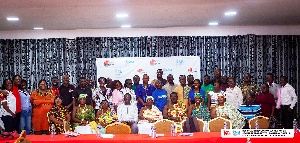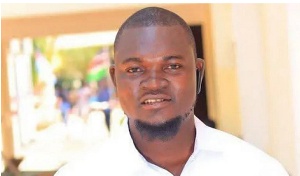- Home - News
- Elections 2024
- News Archive
- Crime & Punishment
- Politics
- Regional
- Editorial
- Health
- Ghanaians Abroad
- Tabloid
- Africa
- Religion
- Photo Archives
- Press Release
General News of Tuesday, 6 May 2025
Source: www.ghanawebbers.com
Stakeholders tasked to champion reproductive health
Workshop on Sexual and Reproductive Health Rights
A consultative workshop on Sexual and Reproductive Health Rights took place in Cape Coast. The goal was to foster partnerships among key stakeholders. This initiative aims to improve Ghana’s population management and sexual health services. It supports the country's commitment to achieving Sustainable Development Goal Three (SDG 3) by 2030.
The workshop was organized by Parliamentary Network Africa. It was themed "Empowering Champions for Reproductive Health Policy Influencing Through Education and Supportive Environments" (ECHOES).
Dr. Godfred Bonnah Nkansa, a population policy analyst, presented an overview of Sexual and Reproductive Health Rights in Ghana. He reported that Ghana's growth rate is currently 2.1 percent. This is lower than Africa's average of 2.4 percent but higher than the global rate of 1.1 percent. He attributed this situation to poverty and inadequate reproductive health education.
Dr. Nkansa highlighted that poorer populations in Ghana have higher birth rates than wealthier ones. He identified four main factors contributing to the high growth rate: child marriage, teenage pregnancy, childbearing, and unmet needs for reproductive services like family planning.
Due to these factors, about 1.2 million children are born in Ghana each year. Dr. Nkansa emphasized the need for a comprehensive approach to address this issue.
Remarks from MSI Director
Ms. Clara Nyakoah Anim, Director of Programmes & Operations at Marie Stopes International (MSI), opened the workshop with remarks on the ECHOES project. She stated that it aims to strengthen key actors' capacity for sustainable progress.
These key actors include Parliamentarians, Ministries, Civil Society Organizations (CSOs), and the Media who play vital roles in sharing information about reproductive health issues.
Ms. Anim explained that reproductive health intersects with education, economic empowerment, gender equality, and social protection. She noted that when girls stay in school and women access family planning, communities benefit greatly.
She added that MSI’s partnership with PNAfrica seeks to empower champions who can influence inclusive policies for comprehensive reproductive health services based on evidence and human rights.
According to Ms. Anim, parliamentarians and local leaders have crucial roles in shaping policies for youth-friendly services and modern contraception access.
The ECHOES project calls for action through capacity building, advocacy, and collaboration to influence institutional policies effectively.
Ms. Anim stressed that these policies must be inclusive and non-discriminatory as SRHR is essential for gender equality, poverty alleviation, education, and national development.
The workshop was funded by MSI Reproductive Choices and attended by participants from various sectors including media representatives, CSOs, academia, teachers, community leaders, and chiefs.











